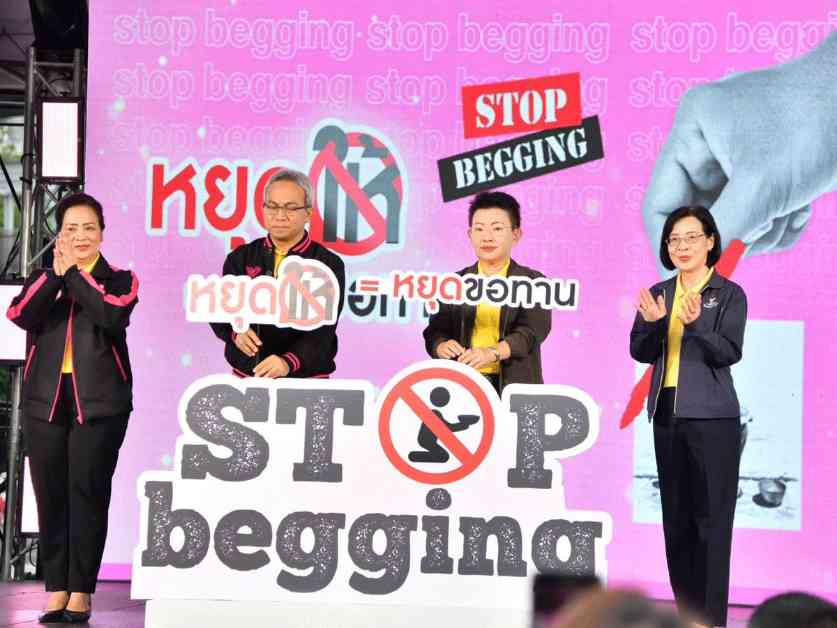Bangkok Launches Initiative to Combat Begging
Bangkok, the bustling capital city of Thailand, has recently announced a new initiative aimed at controlling the issue of begging on its streets. Under the slogan “Give Opportunity to Change Lives…Stop Giving Before Begging,” the city is taking a proactive approach to tackle this social problem. The initiative was unveiled by Dr. Waninya Wattana, the Governor of Bangkok, who emphasized the importance of collaboration between the city government, the Ministry of Social Development and Human Security, and various community networks to raise awareness about the legal implications of begging.
According to Dr. Wattana, begging is not only a social issue but also a legal one. She stressed that giving to beggars perpetuates the cycle of dependency and hinders their chances of developing other skills or finding sustainable sources of income. By refraining from giving, the hope is that the practice of begging will gradually diminish in the city. However, she acknowledged the complexities of the issue, recognizing that desperation and necessity sometimes drive individuals to beg.
Creating Awareness and Providing Support
The initiative aims to educate the public about the legal framework surrounding begging and reduce the prevalence of this practice in Thai society. Through a series of outreach activities, including public campaigns, legal information dissemination, and short documentaries in multiple languages, the initiative seeks to raise awareness among both Thai nationals and foreigners about the importance of adhering to laws and regulations related to begging.
In addition to awareness-raising efforts, the initiative also focuses on providing support to those in need. Temporary shelters, vocational training programs, and livelihood support are some of the avenues through which assistance is being extended to individuals who would otherwise resort to begging. The emphasis is on empowering individuals to take control of their lives and develop self-sufficiency rather than relying on handouts.
Implementation and Enforcement
To ensure the success of the initiative, coordinated efforts are being made to regulate begging activities in high-risk areas across Bangkok. Five designated zones have been identified for enforcement activities, including Siam Square, Pratunam, and various shopping districts. Teams comprising officials from the Ministry of Social Development and Human Security, local authorities, and community networks are conducting outreach activities to discourage both giving and begging in these areas.
The approach taken by the initiative is multifaceted, with a focus on both prevention and intervention. By targeting the root causes of begging, such as poverty, lack of education, and social exclusion, the initiative aims to address the underlying factors that drive individuals to resort to begging. Through a combination of social support services, legal enforcement, and public awareness campaigns, Bangkok is striving to create a more inclusive and supportive environment for vulnerable populations.
In a joint statement, Mr. Anukul Pikakeo, the Minister of Social Development and Human Security, and Ms. Jatuporn Rojanapanich, the Director-General of the Department of Social Development and Welfare, reiterated the government’s commitment to addressing the issue of begging in Thailand. They emphasized the importance of collaboration between various stakeholders, including government agencies, law enforcement, and civil society organizations, to effectively combat the problem.
Community Engagement and Empowerment
Beyond regulatory measures, community engagement plays a crucial role in the success of the initiative. By involving local residents, businesses, and civil society organizations in the effort to combat begging, Bangkok is fostering a sense of collective responsibility towards addressing social issues. Community-based initiatives, such as volunteer programs, donation drives, and skills development workshops, are being implemented to encourage active participation and support from the community.
Empowering individuals to break free from the cycle of begging is at the heart of the initiative’s objectives. By providing access to education, vocational training, and employment opportunities, the initiative aims to equip individuals with the skills and resources needed to lead independent and fulfilling lives. Through partnerships with local businesses and organizations, opportunities for sustainable income generation are being created for those looking to transition away from begging.
As part of the initiative, a series of awareness-raising activities and campaigns are being organized to educate the public about the negative implications of giving to beggars. By highlighting the legal and ethical considerations surrounding begging, the initiative seeks to change perceptions and behaviors towards addressing the issue. Through interactive workshops, public forums, and media campaigns, the initiative is engaging with diverse audiences to promote a culture of giving responsibly and supporting sustainable solutions to poverty.
In conclusion, Bangkok’s initiative to control begging reflects a comprehensive and holistic approach towards addressing a complex social issue. By combining legal enforcement, social support services, and community engagement, the initiative is paving the way for a more inclusive and supportive society where individuals are empowered to lead dignified lives. Through collaborative efforts and a shared commitment to creating positive change, Bangkok is setting an example for other cities to follow in the fight against begging.




















